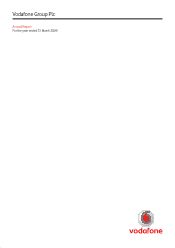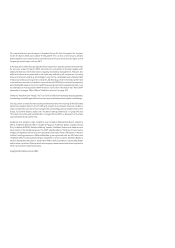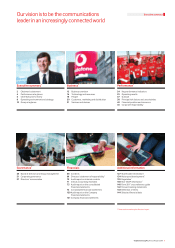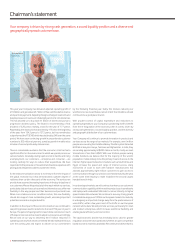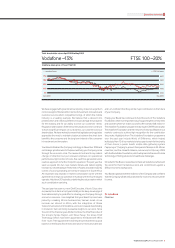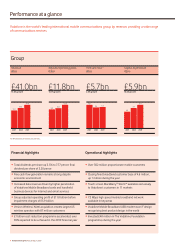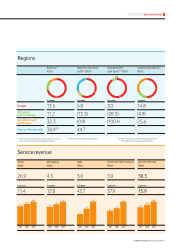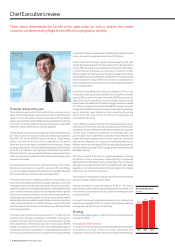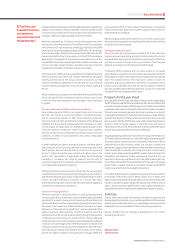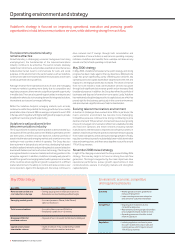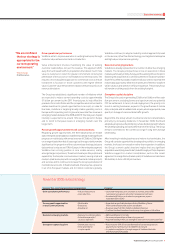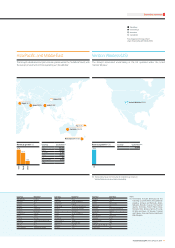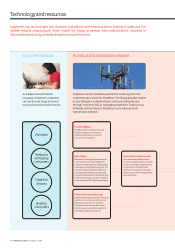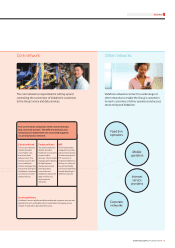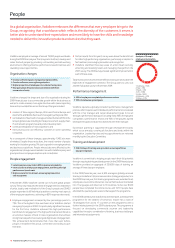Vodafone 2009 Annual Report Download - page 10
Download and view the complete annual report
Please find page 10 of the 2009 Vodafone annual report below. You can navigate through the pages in the report by either clicking on the pages listed below, or by using the keyword search tool below to find specific information within the annual report.
8 Vodafone Group Plc Annual Report 2009
Operating environment and strategy
Vodafone’s strategy is focused on improving operational execution and pursuing growth
opportunities in total telecommunications services, while delivering strong free cash ow.
The telecommunications industry
remains attractive
Notwithstanding a challenging economic background and rising
unemployment, the fundamentals of the telecommunications
industry continue to be attractive. The sector remains relatively
resilient, but not immune, as it provides essential services that serve a
fundamental human need to communicate for work and social
purposes. In this environment, the sector leaders, such as Vodafone,
continue to be able to innovate and deliver new products and services
as well as generate strong cash flow.
Although revenue from traditional services of voice and messaging
in mature markets is growing more slowly due to competitive and
regulatory pressures, there remains a significant growth opportunity
in mobile data. There are also growth opportunities in enterprise and
broadband markets due to increasing demand for integrated solutions,
international services and converged offerings.
Within the Vodafone footprint, emerging markets, such as India,
continue to exhibit the potential for strong growth due to low mobile
penetration rates of around 38% on average, compared to over 120%
in Europe, which together with higher GDP growth prospects, provide
a significant customer growth opportunity.
Vodafone is well positioned in the
telecommunications industry
The Group believes its leading market position is demonstrated by a
strong level of free cash flow, with some £18 billion generated over the
last three years, a resilient structure based on a diverse portfolio of
assets in both mature and emerging markets and a number one or two
ranking in most countries in which it operates. The Group has also
been a pioneer in data products and services, developing high speed
mobile broadband networks and providing simple to use and attractive
devices with features such as touch screen technology. The Group has
a recognised brand in consumer markets and a strong position in the
enterprise segment. In addition, Vodafone is already well placed to
benefit from growth in emerging markets, with a presence in a number
of the countries where significant growth is expected. In a difficult
market environment, the ability to control and reduce costs is ever
more important. Against this background, the Group continues to
drive network and IT savings through both consolidation and
centralisation of core activities, as well as local operating company
initiatives. Vodafone also benefits from a variable cost base as only
around one third of cash operating costs are fixed.
May 2006 strategy
In May 2006, Vodafone formulated a five point strategy and strong
progress has been made against the key objectives. Mobile phone
usage has grown significantly, partly offsetting price declines, key
operating costs and capital expenditure targets have been met and
exposure to emerging markets has increased. The share of revenue
from non-core mobile or total communication services has grown
through both significant data revenue growth and an increased fixed
broadband presence. In addition, the Group has refined its portfolio of
businesses and disposed of several non-core assets. Lastly, Vodafone
has maintained a disciplined approach to its capital structure, which has
proved right for the business, particularly in the current environment,
and also returned a significant level of cash to shareholders.
Evolving telecommunications environment
A number of challenges have evolved since 2006. In particular, the
macro economic environment has become more challenging.
Competitive pressures continue to be strong, contributing to price
declines of around 15% per annum. Consumers have an ever growing
choice of converged communication offers from established mobile
and fixed line operators and newer entrants including handset
manufacturers, internet based companies and software providers. In
addition, mobile virtual network operators, that lease network capacity
from mobile companies, are becoming increasingly prevalent. Finally,
regulators continue to press for substantially lower mobile termination
rates and roaming prices, and these areas together account for around
17% of Group revenue.
November 2008 revised strategy
In light of the changing environment the Group revised its May 2006
strategy. The new key target is to focus on driving free cash flow
generation. This target is supported by four main objectives: drive
operational performance, pursue growth opportunities in total
communications, execute in emerging markets and strengthen
capital discipline.
May 2006 strategy Environment: economic, competitive
and regulatory pressures
May 2006 Progress to November 2008
Revenue stimulation and
cost reduction in Europe
– Driving usage growth to offset price declines
– Delivered on cost and capital expenditure targets
Emerging market growth – Increased presence: Ghana, India, Poland,
Qatar and Vodacom
Total communications – Annualised data revenue £2.8 billion
– Broadband capabilities in 12 markets
Manage portfolio for
maximum returns
– Disposal of non-core assets: Switzerland and Belgium
Capital structure and
shareholder returns
– Higher dividends: 7.51p in 2008 (6.07p in 2006)
– £20 billion cash returned to shareholders
Economy – Weaker global economic growth and
rising unemployment
– Lower roaming revenue as enterprise
and consumer customers travel less
Competition – Ongoing price reductions due to
competitive pressures
– New entrants: Growing range of providers
of converged fixed and mobile services
– Expanding presence of mobile virtual
network operators
Regulation – Industry regulators continue to press
for lower mobile termination rates and
roaming prices, which impacts around
17% of Group revenue

